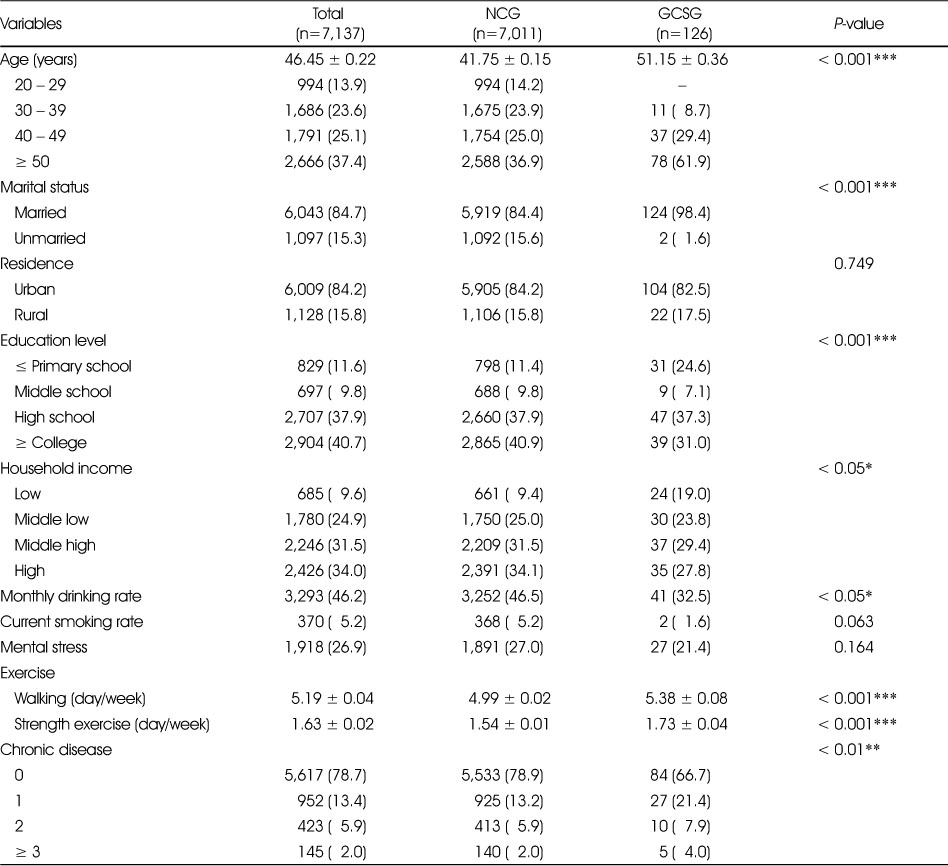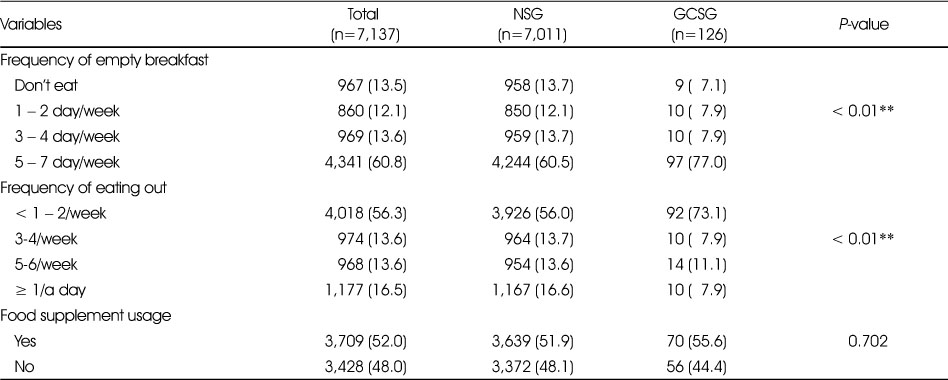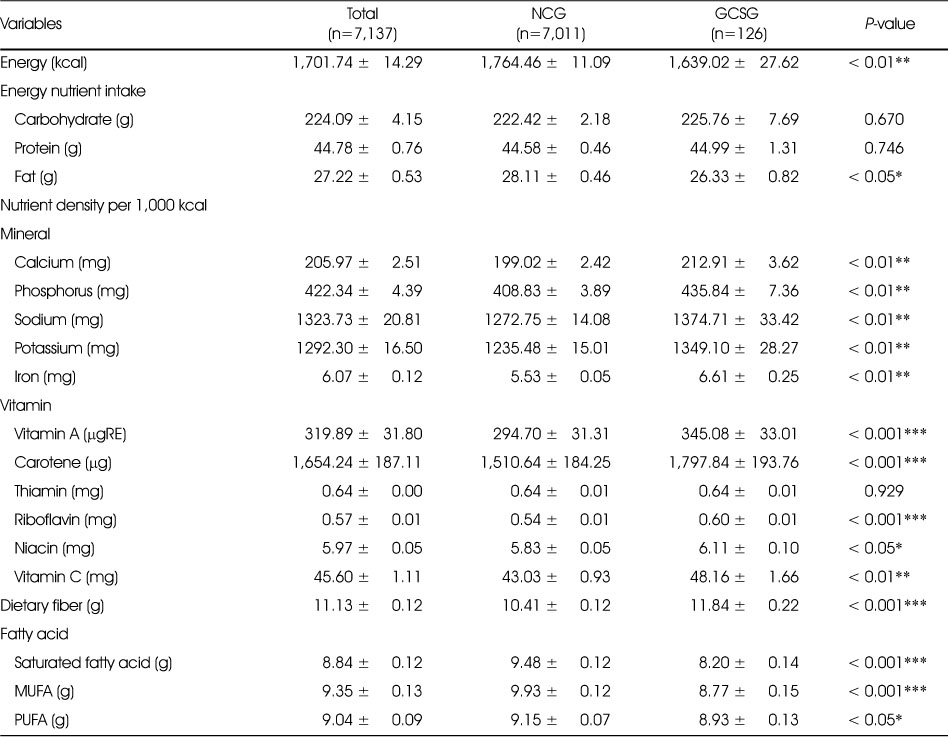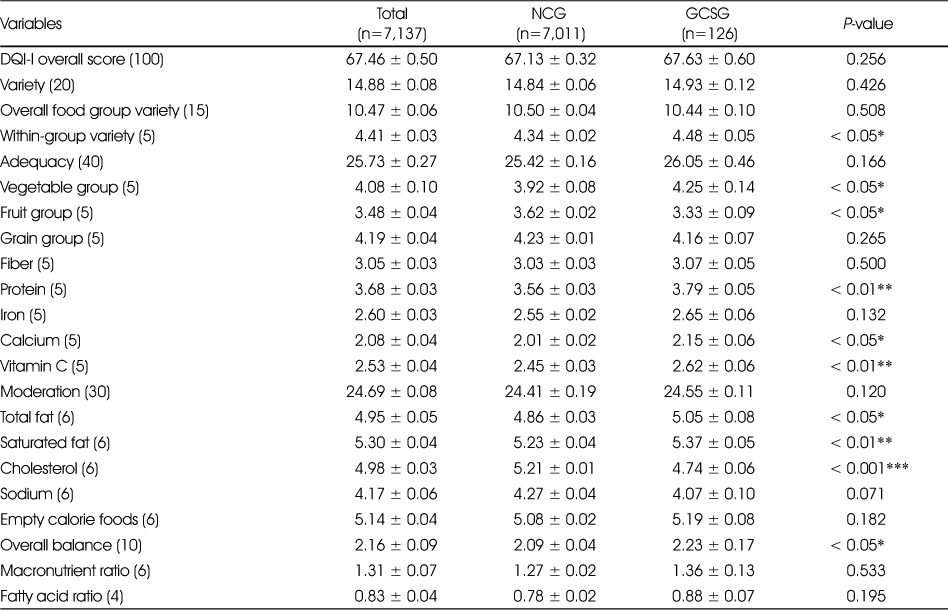Articles
- Page Path
- HOME > Korean J Community Nutr > Volume 25(5); 2020 > Article
- Research Article
- A Comparisons of Nutritional Intake and Diet Quality Index-International in Gynecological Cancer Survivors and Normal Women - Using the Korea National Health and Nutrition Examination Survey 2013~2016 -
- Bo-Young Seo, Eun-Sil Her
-
Korean Journal of Community Nutrition 2020;25(5):406-415.
DOI: https://doi.org/10.5720/kjcn.2020.25.5.406
Published online: October 31, 2020

-
Corresponding author:
Eun-Sil Her,
Email: heres@cs.ac.kr
- 855 Views
- 3 Download
- 2 Crossref
- 0 Scopus
Abstract
Objectives
The aim of this study was to compare the nutritional intake and Diet Quality Index-International (DQI-I) of gynecological cancer survivors and normal women.
Methods This study compared the anthropometric indices, dietary behavior, nutritional intake, and DQI-I in women with previous history of breast or uterine cancer [Gynecological cancer survivors group (GCSG, n=126)] and normal women [Normal control group (NCG, n=7,011)] using the 2013~2016 Korea National Health and Nutrition Examination Survey data.
Results Body mass index and waist circumference were lower in the GCSG compared the NCG. The frequency of skipping breakfast and eating out was higher in the NCG compared to GCSG. Energy and fat intake were significantly higher in the NCG than in the GCSG, whereas intake of all minerals and vitamins (excluding thiamine), and dietary fiber intake were higher in GCSG. It was observed that the fatty acid intake of the GCSG was significantly lower than that of the NCG. The diet quality evaluation using DQI-I results showed that GCSG was higher in the “within-group” diet variety and adequacy of vegetable group than the NCG, whereas the intake level of the fruit group was higher in NCG. Besides, protein, calcium, and vitamin C intake were higher in the GCSG than in the NCG. The GCSG showed higher levels of total fat and saturated fat moderation than the NCG, whereas cholesterol moderation showed the opposite results. The results of DQI-I comparison according to the cancer survival years showed that the overall score and scores related to diet adequacy and balance were higher in the below 5-year group, whereas the over 5-year group scored higher in terms of moderation of diet.
Conclusions The results of this study suggest that a chronic disease based management approach is needed in cancer survivors. The study provides important data which can help in the preparation of guidelines for long-term lifestyle and diet management, in these patients.
Published online Oct 31, 2020.
https://doi.org/10.5720/kjcn.2020.25.5.406
A Comparisons of Nutritional Intake and Diet Quality Index-International in Gynecological Cancer Survivors and Normal Women: Using the Korea National Health and Nutrition Examination Survey 2013~2016
Abstract
Objectives
The aim of this study was to compare the nutritional intake and Diet Quality Index-International (DQI-I) of gynecological cancer survivors and normal women.
Methods
This study compared the anthropometric indices, dietary behavior, nutritional intake, and DQI-I in women with previous history of breast or uterine cancer [Gynecological cancer survivors group (GCSG, n=126)] and normal women [Normal control group (NCG, n=7,011)] using the 2013~2016 Korea National Health and Nutrition Examination Survey data.
Results
Body mass index and waist circumference were lower in the GCSG compared the NCG. The frequency of skipping breakfast and eating out was higher in the NCG compared to GCSG. Energy and fat intake were significantly higher in the NCG than in the GCSG, whereas intake of all minerals and vitamins (excluding thiamine), and dietary fiber intake were higher in GCSG. It was observed that the fatty acid intake of the GCSG was significantly lower than that of the NCG. The diet quality evaluation using DQI-I results showed that GCSG was higher in the “within-group” diet variety and adequacy of vegetable group than the NCG, whereas the intake level of the fruit group was higher in NCG. Besides, protein, calcium, and vitamin C intake were higher in the GCSG than in the NCG. The GCSG showed higher levels of total fat and saturated fat moderation than the NCG, whereas cholesterol moderation showed the opposite results. The results of DQI-I comparison according to the cancer survival years showed that the overall score and scores related to diet adequacy and balance were higher in the below 5-year group, whereas the over 5-year group scored higher in terms of moderation of diet.
Conclusions
The results of this study suggest that a chronic disease based management approach is needed in cancer survivors. The study provides important data which can help in the preparation of guidelines for long-term lifestyle and diet management, in these patients.
Table 1
General characteristics of subjects
Table 2
Anthropometric indices by Gynecologic cancer1)
Table 3
Dietary behavior by Gynecologic cancer
Table 4
Nutrient intake by Gynecologic cancer1)
Table 5
DQI-I component scores by Gynecologic cancer1)
Table 6
Comparison of DQI-I by survival period of gynecological cancer1)
Acknowledgments
This work was supported by Changshin University Research Fund of 2019-63.
References
-
Statistic Korea. Life table [Internet]. Statistic Korea; 2016 [updated 2019 Dec 4]. [2020 Aug 15].Available from: http://kostat.go.kr/wnsearch/search.jsp.
-
-
National Cancer Information Center. Cancer incidence rate [Internet]. National Cancer Information Center; 2017 [updated 2017 Dec 31]. [2020 Aug 15].Available from: https://www.cancer.go.kr/lay1/S1T639C640/contents.do.
-
-
Song SH, Youn HJ, Park M, Hwang E, Moon HG, Noh DY. The association between the adherence to dietary guidelines for breast cancer survivors and health-related quality of life among Korean breast cancer survivors. Korean J Community Nutr 2015;20(2):129–140.
-
-
McCorkle R, Ercolano E, Lazenby M, Schulman-Green D, Schilling LS, Lorig K. Self-management: enabling and empowering patients living with cancer as a chronic illness. CA: Cancer J Clin 2011;61(1):50–62.
-
-
Foster C, Fenlon D. Recovery and self-management support following primary cancer treatment. Br J Cancer 2011;105(1):S21–S28.
-
-
Oh SY. Analysis of methods on dietary quality assessment. Korean J Community Nutr 2000;5(2):362–367.
-
-
Kim MS, Kim JY, Bae WK, Kim SH, Lee YS, Na WR. Relationship between nutrients intakes, dietary quality, and serum concentrations of inflammatory markers in metabolic syndrome patients. Korean J Community Nutr 2011;16(1):51–61.
-
-
Lee YJ, Koo HY, Cho IY, Jo MK, Kim KC, Eum YH. Dietary patterns assessed by the Diet Quality Index-International among cancer survivors compared with healthy control subjects: using the Korea National Health and Nutrition Examination Surveys 2013-2015. Korean J Fam Pract 2019;9(2):204–211.
-
-
Yun HK, Kim H, Chang N. Diet quality index-international score is correlated with weight loss in female college students on a weight management program. Korean J Nutr 2009;42(5):453–463.
-
-
Son JH, Choe HS, Hwang JY, Song TJ, Chang Y, Kim YJ. Association between intakes of minerals (potassiom, magnsium, and calcium) and diet quality and risk of cerebral atherosclerosis in ischemic stroke patients. J Nutr Health 2015;48(2):167–179.
-
-
Kim HR. Quality of diet and nutritional intake and mortality risk among South Korean adults based on 12-year follow-up data. Korean J Community Nutr 2016;21(4):354–365.
-
-
Kim K, Kim MK, Kim J, Park K, Park S, Song YJ, et al. In: Nutritional epidemiology (translated version). 3rd ed. U.S. original written by Willett W. Paju: Kyomunsa; 2013. pp. 333.
-
-
Fernandes WC, Kimura M. Health related quality of life of women with cervical cancer. Rev Lat Am Enferm 2010;18(3):360–367.
-
-
McCorkle R, Ercolano E, Lazenby M, Schulman-Green D, Schilling LS, Lorig K. Self-management: Enabling and empowering patients living with cancer as a chronic illness. CA: Cancer J Clin 2011;61(1):50–62.
-
-
Seo JS, Park HA, Kang JH, Kim KW, Cho YG, Hur YI. Obesity and obesity-related lifestyles of Korean breast cancer survivors. Korean J Health Promot 2014;14(3):93–102.
-
-
Lee EJ, Lee WK, Suh SW, Suh BH, Lee HS. Intakes of energy and nutrients and risk of breast cancer: case-control study in DaeguGyeongbuk area, Korea. Korean J Nutr 2008;41(8):754–766.
-
-
Park MS, Hwang EK, Moon HG, Noh DY, Lee JE. Dietary intake status among Korean female breast cancer survivors. Korean J Community Nutr 2014;19(2):163–175.
-
- Related articles
-
- Self-reported weight change and diet quality in relation to metabolic syndrome among Korean cancer survivors: a cross-sectional study using the Korea National Health and Nutrition Examination Survey 2019–2021
- Analysis of the relationship between sugar intake and cancer prevalence: a cross-sectional study using the 8th Korea National Health and Nutrition Examination Survey
- Trends in growth and nutritional status of Korean toddlers and preschoolers: a cross-sectional study using 2010–2021 Korea National Health and Nutrition Examination Survey data
- Total sugar intake and its contributed foods by age groups in Koreans using the 8th (2019–2021) Korea National Health and Nutrition Examination Survey: a cross-sectional study
- Comparison of blood biochemical characteristics and dietary intake by sex in gastric cancer patients over 40 years in Korea based on 7th (2016-2018) Korea National Health and Nutrition Examination Survey: a cross-sectional study
- Changes in nutritional status of Korean older adults during COVID-19 Pandemic by household income and demographic factors -using the Korea National Health and Nutrition Examination Survey(2019-2020): a cross-sectional study

 KSCN
KSCN







 Cite
Cite


